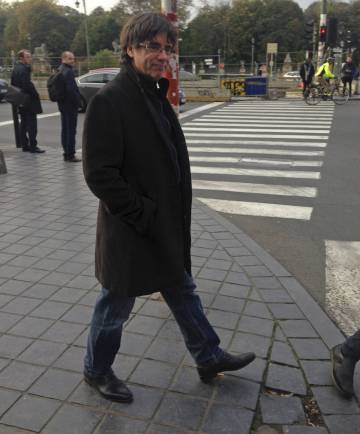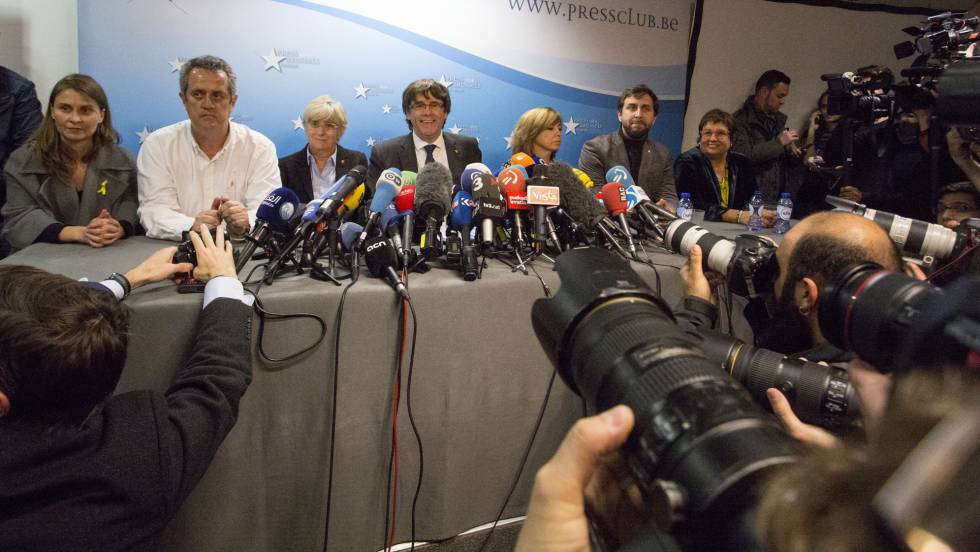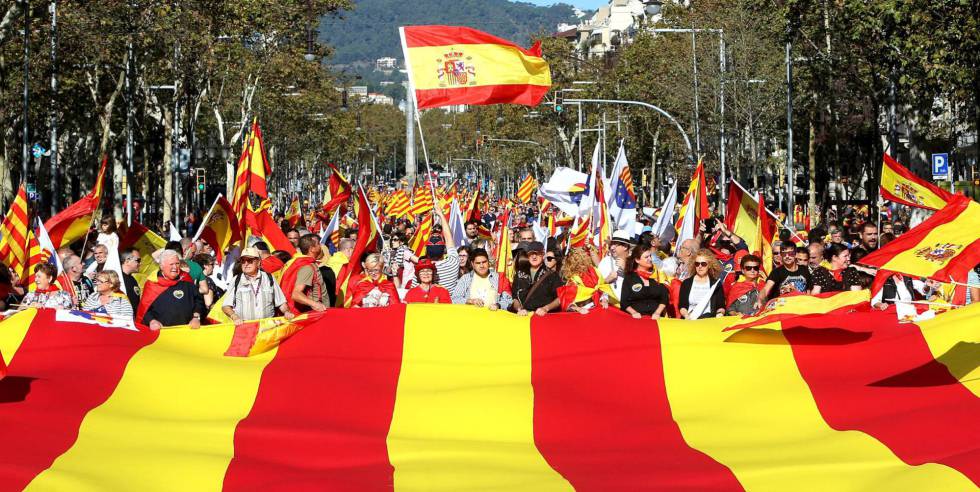CATALAN INDEPENDENCE
An X-ray of Puigdemont’s speech in Brussels
EL PAÍS analyzes the contradictions in the former premier’s appearance on Tuesday
Barcelona / Madrid

Former Catalan regional premier Carles Puigdemont on Wednesday in Brussels after his press conference. MARK CARLSON AP
Speaking in Brussels on Tuesday, former Catalan premier Carles Puigdemont depicted Spain as a place with no legal or democratic guarantees – a country that prevents him from returning to face a “fair” trial for the crimes of sedition, rebellion and misuse of public funds in connection with the illegal independence referendum of October 1.
Either ignoring or choosing to forget the separation of powers that exists in this country, the ousted Catalan leader delivered a speech – in three languages – that followed the usual script, filled with contradictory arguments and half-truths that he used to seek international support for his project. The following are chief examples.
“Since October 1, our hand has been extended in an invitation to dialogue, to the extent that we even proposed suspending the declaration of independence.”
Suspending something that was illegal in the first place is not extending your hand. And Puigdemont’s offers of dialogue were always expressed negatively: he did not show up at the meeting of regional premiers, nor did he honor reiterated invitations to come to the Spanish Senate and Congress. His only disposition to dialogue was based on the condition that the dialogue would deal with the format and dates for the independence referendum.
“The (Spanish) state’s aggressiveness, of which there are so many examples: 700 mayors facing legal action, thousands of people beaten when they were going to exercise their right to vote [on October 1], the impunity enjoyed by the far right, exorbitant fines against organizers of the November 9 (2014) plebiscite [in Catalonia], the charges by state prosecutor General Maza…”.
The 700 cases he mentions are currently on hold, although they have not yet been definitively dropped: they were initiated by prosecutors, not by judges.
And the police action of October 1 has been widely debated. Many people sustained bruises, two suffered minor injuries, and two serious injuries. All of them have recovered. If there are people who have no moral authority to talk about police violence, that is the Catalan leaders who sent in the Mossos d’Esquadra to subdue protestors with the Indignados anti-austerity movement: a woman named Esther Quintana lost an eye from a rubber bullet fired at her during a general strike in 2012.
And there were no “multi-million euro” fines for organizing the non-binding referendum of November 9, 2014. Instead, the Audit Court asked for the return of the public money (€5.2 million) that was used by the government of former Catalan premier Artur Mas to finance the banned vote.

“The measures adopted by the Catalan government since Friday (...) are consistent with the values of peace, respect for plurality and neutrality that we have always pursued.”
The governments of Artur Mas and Carles Puigdemont never displayed the “neutrality” that the latter boasts of – much less so during the two attempted referendums that they launched, conducting a biased campaign, manipulating the public broadcaster and stripping opposition deputies of their power. International observers present at the October 1 vote concluded that minimum standards for considering a referendum valid had not been met.
“This government could have forced loyal public employees to start a dispute over control (of Catalan institutions), but instead it chose to guarantee that there will be no confrontation and no violence. A republic for all cannot be built on a foundation of violence. If the Spanish state wants to build its project on violence, that’s their decision to make, but they cannot drag us into a scenario that the sovereignty movement has consistently rejected, as all democrats should.”
If Puigdemont feels it would have been legitimate to force government employees to undertake illegal activities, that speaks volumes about his personal concept of democracy and government “neutrality.” So much for “a republic for all cannot be built on a foundation of violence.” There’s no doubt that all Catalans must be feeling most grateful for this gracious concession. Renouncing the use of unregulated violence is not something one can choose to do in a democracy: it is a pre-existing condition of democracy.
“One part of the (Catalan) government has come to Brussels… to denounce the politicization of the Spanish justice system.”
Even though the Spanish judiciary is on a par with that of any advanced democracy, it has its faults and could be improved. But it does not contain such serious flaws as the one contained in the draft design for a Catalan justice system, under which the head of the Supreme Court would be personally appointed by the president of the Catalan republic, who would also be head of the executive or first minister, an uncommon accumulation of responsibilities in a European country.
In this hypothetical Catalan justice system, all legal appointments would be made by a mixed committee where the government would have a majority. Now here is a perfect example of the “politicization of the justice system” and its subservience to governing powers. It would mean the end of the rule of law.
“Under no circumstances will we abandon the Catalan government; we will continue to perform our duties despite the limitations imposed by our non-confrontational strategy, and we will confront the State’s politically motivated legal action from a political position, not a legal one.”
Had Puigdemont renounced the position that he was removed from? Certainly, his trip to Brussels and the secrecy surrounding it, combined with the statements made by an unusual Belgian lawyer, gave his trip a feeling of flight, of a search for individual protection in the form of asylum.
Belgium’s deputy prime minister and economy chief, Kris Peeters, underscored the strangeness of Puigdemont’s conduct when he said: “If you are going to declare independence, you usually stay with your people.”
Meanwhile, the prosecutor’s complaint may be right on target,or open to improvements, or absolutely spotless, but in any case, it would only be “political” if it denounced political actions. Instead, it deals with conduct (political in origin) that could be construed as illegal and consistent with felonies encoded in the Criminal Code. To consider that Puigdemont’s behavior as a political leader should be automatically excluded from legal action is to grant him immunity privileges and a carte blanche that are nowhere reflected in the Spanish Constitution or in the Catalan statute of autonomy.
It is contradictory to say that the December 21 regional election is “a democratic challenge” yet support initiatives to stop Article 155
Puigdemont’s claim that he would return if “a fair trial” could be guaranteed runs along the same lines. What guarantees would those be? Procedural guarantees, which are by definition the same for all Spanish citizens? Or personal privileges by virtue of the position he used to hold?
His claims ignore the separation of powers and the independence of the judiciary. Although the public prosecutor’s office is formally independent, it can be so to a greater or lesser degree depending on the characteristics of the individuals who exercise it. Even so, judges act independently from the public prosecutor.
During the course of the same legal proceedings, judges may impose strict precautionary measures on some suspects (such as Jordi Sànchez and Jordi Cuixart – the leaders of the civic groups National Catalan Assembly (ANC) and Òmnium, who are in pre-trial custody) and more lenient ones on others (such as former chief of the Catalan police force Josep Lluís Trapero, who has to report to the court periodically), despite the fact that prosecutors had requested similarly tough measures for all.
“We will support initiatives to stop Article 155 from taking effect and dismantling the Catalan institutional system (...) We accept the election set by the Spanish state as a democratic challenge.”
It is contradictory to say that the December 21 election is “a democratic challenge” yet support initiatives to stop the application of Article 155. The election has been called by Prime Minister Mariano Rajoy precisely through the emergency powers vested on him by the application of Article 155. Puigdemont could have easily called the election himself – he had been encouraged to, and had in fact been widely expected to do so the day before independence was declared.

“We will accept the result of the election, as we have always done.”
False. The secessionist bloc obtained less than 50% of the popular vote at the last regional election, yet considered that it had a “democratic mandate” to go down the road to unilateral independence. It did not respect the outcome of that election, instead politically manipulating it and building itself up into the government of a minority.
“The Catalan cause is the cause of the values that Europe is based on.”
EU institutions and governments have said countless times that the cause of Catalan secessionism violates European principles because it violates Spanish constitutional laws. Puigdemont’s vague appeal to democratic values, especially when these have been infringed, is mostly irrelevant. The EU has been a global role model in breaking down internal barriers, and it cannot risk building new ones, as that could herald a return of the risks to stability that led to two world wars.
“We are working to ensure that the PP, PSOE and Ciudadanos [political parties] cannot dismantle the Catalan institutions.”
It was the secessionist bloc that dismantled Catalan regional institutions when it violated the Catalan Statute through self-made breakaway laws passed on September 6 and 8. Restoring them is what it’s all about now.
English version by Susana Urra.





































No hay comentarios:
Publicar un comentario